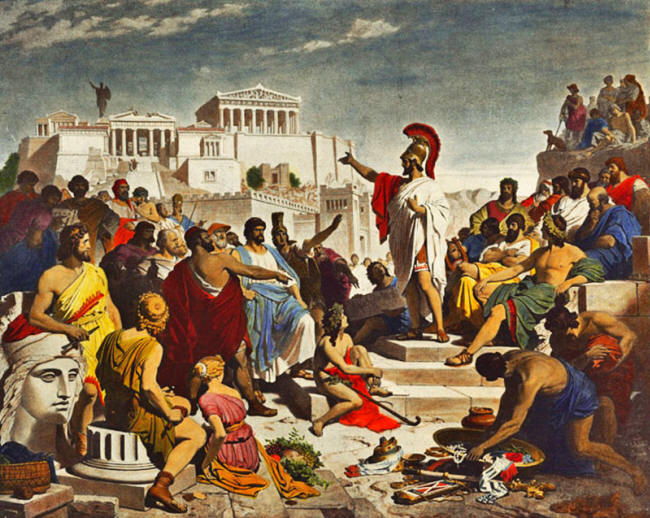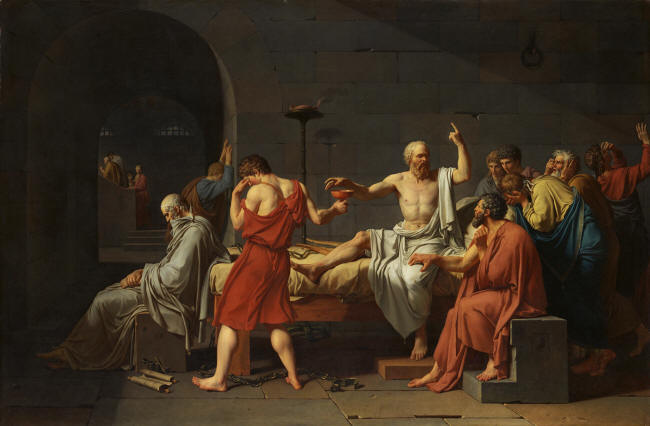|
by Van Bryan
Nineteenth-century painting by Philipp Foltz depicting the Athenian politician Pericles delivering his famous funeral oration in front of the Assembly. Wikipedia
At the time the system of government was designed to be a direct democracy, which would mean that every eligible citizen would have the opportunity to vote on each piece of legislation.
This new form of government empowered the common citizen in ways that were unheard of. Individuals not from aristocracy, yet who possessed political ambition, often found themselves hoisted to the highest ranks of Athenian politics.
One example is the famous Athenian general and statesman Themistocles, who would be essential in the salvation of Greece during the second Persian invasion.
Of course it was far from perfect.
Only free men who had completed their military service were allowed to vote on any legislation.
This meant that only about 20% of the population were actually able to vote. Women were not allowed to vote and subsequently possessed significantly fewer rights than men. These were not the only complaints against the early democracy of Athens.
In the course of his writings, the philosopher Plato extensively examined what he considered serious dangers that resided within the system of democracy.
Plato would write about the trial of Socrates in his first essay The Apology.
Plato would later describe the trial of Socrates as a doctor being persecuted by a pastry chef and judged by a jury of children. Still, Socrates was not the only man to be executed in such a manner.
These men were tried and executed one after another until only one remained. It was only after nine men were dead, that a simple accounting error was discovered and the remaining treasurer was released.
Also, after the naval victory of Arginusae, several Athenian commanders were accused of failing to collect survivors after the battle. Six commanders were executed for failing to perform their duties.
The city would later
repent for these executions by executing the original men who had
accused the generals.
Jacques-Louis David, 1787. Metropolitan Museum of Art, New York.
However Plato believed there was a far more sinister nature to democracy.
In book VIII of The Republic, Plato begins to describe several stages of government that are intolerable, yet unavoidable.
Plato predicts a society with an enormous socioeconomic gap, where the poor remain poor and the rich become richer off the blood and sweat of others.
In this instance, the people will long for freedom and liberty. They will use it as a battle cry against their oppressors, sparking a revolution. From this revolution, blood will be spilled and many will die.
During this time of violent transition, the people will rally behind one man, or a few men, whom they believe to be their savior. The people will lift this champion to great heights and anoint him with sacred responsibilities to bring liberty to the land.
When the smoke clears the old regime will be gone and a democracy will be supplanted.
And while this is reminiscent of several historical revolutions, including the American revolution, Plato warns that the trouble only intensifies from here.
Plato
During the course of his writings Plato differentiates between necessary desires and unnecessary desires.
These types of desires are a result of a rapid influx of liberty into the population.
Plato predicts that the people will demand freedom at every turn, fighting any form of authority and demanding more liberty. We become obsessed with our freedom and become willing to sacrifice necessary things like social order and structure to attain it.
These democratic leaders will realize that they are only easily supported when there is a war that the people can rally behind.
And so,
Plato continues in his discussion by explaining that the these leaders will eventually become unpopular, an unavoidable result.
Plato predicts that this tyrant will appeal to the lowest form of citizen.
Plato's description of a democracy is rather thought provoking.
It gives us pause and forces us to examine our own government.
Perhaps...
History has shown a
consistent pattern of subjugation, revolution and subjugation once
again.
Liberty Leads the People, by Eugene Delacrox
Take a minute and think about,
And before you decide to judge the philosopher Plato, try to remember that he is often considered one of the wisest men to ever live:
Indeed, it has been said that any philosophy after Plato can only be considered a footnote on any of his work.
It was the political philosopher Thomas Paine who describe government as,
And if we are to think in this manner, then perhaps democracy is simply the least damaging form of government we have been able to create over the course of human existence.
A thinly veiled tyranny is better than outright oppression.
And the next time we
celebrate the
4th
of July, keep in mind that a far wiser man than
any of us once called to our attention the unavoidable and
disastrous nature of the pursuit of liberty...
|





